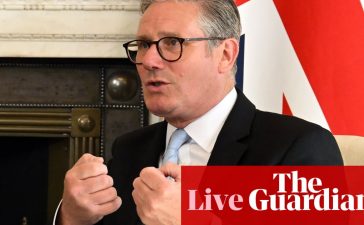Closing summary: Royal Mail to make ‘drastic cut’ to second-class deliveries
Royal Mail’s plan to end daily second-class deliveries would be a “drastic cut” that would hit many small businesses, according to the Federation of Small Businesses, a lobby group.
However, the group also said that it was reasonable for Royal Mail to take an extra day for second-class letters, and that it was glad that the postal service, owned by parent compay International Distributions Services, had not pursued a plan to cut its six-day service for first-class letters.
Tina McKenzie, the FSB’s policy chair, said:
Taking the axe to daily deliveries for second class would be a drastic cut which would hit the many small businesses which rely on it, and will in all probability leave some with no choice but to fork out for first class.
However, Royal Mail’s concession to retain a six-day-a-week service for first class letters is a good step in the right direction, compared to its original dire proposal – voiced via Ofcom – to torpedo daily deliveries altogether.
You can read the full details of Royal Mail’s proposals here:
In other financial news today:
-
Eurozone inflation dropped to 2.4% in March, surprising economists and adding to the case for interest rate cuts sooner rather than later.
-
Tesla will look for sites to build a factory in India after securing a concession on tariffs from the country’s government, the Financial Times has reported.
-
Virgin Atlantic has said that expects to make a profit this year, after narrowing its losses during 2023 in the long aftermath of the coronavirus pandemic.
-
Network Rail is to spend nearly £3bn to protect the railway from the effects of the climate crisis and extreme weather.
-
Major European airlines have started to resume flights to and from Israel, with Wizz Air, easyJet and British Airways all now flying to Tel Aviv, and Virgin Atlantic planning a resumption later this year.
-
Donald Trump’s social media company Trump Media managed to go public last week only after it had been kept afloat in 2022 by emergency loans provided in part by a Russian-American businessman under scrutiny in a federal insider-trading and money-laundering investigation.
-
The US private sector added more jobs than expected in March, according to a payrolls company, in a sign of the strength of the world’s largest economy.
You can continue to read our live coverage from around the world:
In the UK, Rishi Sunak resists calls to halt arm sales to Israel
In the US, Trump leads Biden in six swing states, a new poll shows
In our coverage of the Russia-Ukraine war, a Ukrainian minister calls for more air defences
In our coverage of the Middle East crisis, the UN human rights council is to consider call for Israel arms embargo
In Taiwan, nine killed, more than 900 injured and dozens still trapped after strongest earthquake in 25 years
Thanks for following today. Please join me again tomorrow, bright and early, for more of the same. JJ
Key events
Wall Street’s main share indices have dipped at the opening bell on Wednesday after stronger-than-expected jobs data.
Signs of a stronger economy could persuade the Federal Reserve to delay interest rate cuts, which would usually help company earnings.
Here are the opening snaps (via Reuters):
-
S&P 500 DOWN 7.90 POINTS, OR 0.15 %, AT 5,197.91
-
NASDAQ DOWN 68.50 POINTS, OR 0.42 PERCENT, AT 16,171.95
-
DOW JONES DOWN 17.12 POINTS, OR 0.04 PERCENT, AT 39,153.12
Barclays asks for shareholder permission to increase bonuses

Kalyeena Makortoff
Barclays has become the latest UK lender to ask shareholders to green-light bigger bonuses for its bankers.
Like HSBC, Barclays wants to take advantage of the UK’s decision to scrap the banker bonus cap, which was originally introduced after the 2008 financial crisis and limited bonuses at twice an individual’s base salary.
But while UK regulators officially lifted the cap in October 2023, Barclays held fire, instead saying it would review its position from 2024 onward.
The bank is now asking shareholders to give its remuneration committee powers to boost bonuses for some of its highest-paid bankers – who are referred to as “material risk takers”, some of which earn more than €1m (£858,000) – at their discretion.
The resolution – which will be put to a shareholder vote at Barclays’ AGM on 9 May – will ask:
That the Company and its subsidiaries be authorised to determine and apply such maximum ratio or ratios of the variable to fixed components of total remuneration for ‘Material Risk Takers’ as the Company considers appropriate, in accordance with applicable regulations.
However, the potential exponential rise in bonuses will not apply to executives yet – they’ll have to wait until the next remuneration policy is put forward to shareholders in 2026.
*this post has been updated to clarify that not all material risk takers earn more than €1m.
Chinese-owned British Steel has said that it has received planning permission to build an electric arc furnace at its Teesside plant, as it seeks to keep up pressure on the UK government to give financial support.
British Steel is hoping to receive as much as £500m in government subsidy for its £1.25bn plan to replace two blast furnaces at Scunthorpe. Those plans could threaten the jobs of as many as 2,000 steelworkers, although the likelihood of job cuts did not prevent rival Tata Steel from receiving a large promise of government support.
The company said its application was approved by Redcar and Cleveland Borough Council, while plans for a sister furnace in Scunthorpe are still being considered.
Xijun Cao, British Steel’s chief executive, emphasised that talks with the government over the support have been going on since 2022. He said:
The proposed installation of EAFs in Scunthorpe and Teesside is central to our journey to a green future as they would help us reduce emissions of CO2 by more than 75%. However, it is crucial we now secure the backing of the UK government.
Our owner, Jingye, is committed to the unprecedented investment decarbonisation requires and our desire to dramatically reduce our carbon footprint, coupled with challenging market conditions, means it is imperative swift and decisive action is taken to ensure a sustainable future for British Steel.
The electric arc furnaces would be much smaller, and require far fewer workers than when the blast furnaces at Redcar supported an entire community. However, it would still mark a significant moment for Redcar, where many people had long given up hope of a return of steelmaking.
Tesla considering India factory reports Financial Times
Tesla will look for sites to build a factory in India after securing a concession on tariffs from the country’s government, the Financial Times has reported.
Elon Musk’s car company is going through a tough period, with the number of deliveries falling during the first three months of the year. That was the first time sales had fallen for four years, amid fierce competition among electric vehicle makers.
Tesla is planning to sell many more cars in the future – and it will need to do so to justify its valuation of more than $530bn (£420bn – seriously!), which is more than five times higher than any carmaker barring Toyota.
The FT said:
The people with knowledge of Tesla’s plans said it would send a team from the US by late April to study sites for the plant, focusing on states with existing automotive hubs, including Maharashtra and Gujarat in the west and Tamil Nadu in the south.
And the paper points out that securing a Tesla investment would be a handy political boost for Indian prime minister Narendra Modi, who is the favourite in the general election this month.
Tesla has plants in the US, China and Germany. It has previously considered investing in the UK, but decided against it because of Brexit.
The large earthquake in Taiwan is thought to have trapped 70 people in Taiwan, the Associated Press has reported.
Taiwan’s national fire agency appears to have confirmed 64 miners are trapped in one mine and six in another, both in Hualien County near the earthquake’s epicentre.
You can follow more developments when we have them on our dedicated live blog:
US private sector added more jobs than expected in March
The US private sector added more jobs than expected in March, according to a payrolls company, in a sign of the strength of the world’s largest economy.
There were 184,000 new jobs during the month, said ADP. That was significantly higher than the 148,000 average forecast by economists polled by Refinitiv.
It was also an increase compared with the 155,000 jobs added in February, according to newly revised data. ADP’s data also suggest that pay growth increased by 5.1% year-on-year.
ADP’s data is closely followed because it gives a good indication of what is ahead for official non-farm payrolls data, one of the key gauges of how the US labour market is performing. It is closely watched by the US Federal Reserve, which is weighing up whether to cut interest rates in June.
Nela Richardson, ADP’s chief economist, said:
March was surprising not just for the pay gains, but the sectors that recorded them. The three biggest increases for job-changers were in construction, financial services, and manufacturing. Inflation has been cooling, but our data shows pay is heating up in both goods and services.
Struggling state-owned ferry operator CalMac has removed its chief executive after a review into transport problems for Scotland’s island communities.
Caledonian MacBrayne, which is owned by the Scottish government, said that Robbie Drummond had stepped down with immediate effect.
The ferry company’s performance has been a long-running political issue for the Scottish government, led by the Scottish National Party, over competence and the award of contracts to political allies. CalMac has faced years of delays which have resulted in significant problems with transport from the mainland to the Hebrides, while Scottish state-owned shipbuilder Ferguson Marine is also behind and far over budget for two new ships for CalMac.
CalMac on Wednesday said it wanted to “strengthen the focus further on operational performance of an ageing fleet, resilience and enhanced dialogue and responsiveness with the customers and the communities CalMac serves” ahead of “some challenging years”.
Duncan Mackison, former chief executive of David MacBrayne Ltd, a holding company for the ferry group, has been appointed interim boss until a permanent successor has been appointed.
The company said:
The Caledonian MacBrayne Ltd board takes the responsibility of delivering the Clyde and Hebrides Ferry Service (CHFS) contract extremely seriously. It recognises, that the island communities served by CalMac have faced real challenges over this past year. These challenges are likely set to continue until new vessels are introduced to the fleet over the coming years.
Adverts featuring the actor Dominic West as a sneering bank manager will be pulled from TV in their current form after the advertising watchdog ruled they were misleading because they wrongly suggest that the building society had not closed branches.
The Advertising Standards Authority (Asa) received 281 complaints, including one from rival lender Santander, about the advert, which ran in October and November. The Nationwide campaign took a swipe at high street banks that have been closing branches.

Phillip Inman
A recovery in China’s manufacturing output has failed to offset a slide in Asian stock markets that followed an earthquake in Taiwan that has killed at least nine people and forced semiconductor factories at the heart of global supply chains to shut down.
China’s factories enjoyed a period of expansion for the first time in six months in March, an official survey showed.
The official purchasing managers’ index (PMI) rose to 50.8 in March from 49.1 in February, rising above the 50-level that separates growth from contraction, and hitting the highest mark since March 2023.
Manufacturing remains a big sector in China’s economy and an important demand centre for metals such as copper and steel, as well as energy required to make goods.
The PMI followed other recent data, including a separate measure of the services industry, that suggested China‘s economy is gaining some momentum after struggling for growth in 2023.
Shares of Taiwan Semiconductor Manufacturing Co slumped 1.3% after the semiconductor giant said some facilities were evacuated after the quake. Barclays analysts said in a client note:
There have been reports of halts to semiconductor production operations, and if these become more broad-based, we expect some constraints on production, in both Taiwan and the region, that could result in upstream pricing pressures in the chip sector.
China’s blue-chip CSI300 index and Shanghai Composite index eased 0.4% and 0.2%, respectively, while Hong Kong’s Hang Seng Index fell 1.2%.
The MSCI’s Asia ex-Japan stock index shed 0.9%, compared with the 0.6% slide in the broader emerging markets stock index.
Royal Mail faces political backlash over plans to cut delivery days
Royal Mail faces the prospect of a political backlash against its plans to cut the number of days it carries out second-class deliveries.
It is a “slap in the face for families”, Liberal Democrat business spokesperson Sarah Olney has said. She said:
These plans are a slap in the face for families being asked to pay more for less. The cost of first and second-class stamps has gone up sharply in recent years.
It risks creating a cost-of-postage crisis as people feel forced to pay for first-class stamps because second-class delivery days are being slashed. People shouldn’t have to pay the price for Royal Mail’s failure after executives missed their delivery targets and paid themselves eye-watering bonuses.
It is an example of the political difficulties facing Heathrow executive Emma Gilthorpe, who was this week chosen to run Royal Mail.
Royal Mail’s parent company, International Distributions Services (IDS), proposed cutting back the Monday-to-Saturday second-class service to “every other weekday”. The proposals would also include Royal Mail cutting 1,000 jobs and saving £300m a year.
IDS said its suggestions would not require legislative change and it urged Ofcom to “act swiftly to introduce reforms by April 2025”.
The proposals would mean second-class deliveries would be slower, but there would still be the option of a more expensive next-day delivery.
You can read the full story here:
EU to enforce spending rules on Italy and other countries

Phillip Inman
European Union officials are poised to resurrect dormant rules forcing the 27 member states to stick within strict public spending rules, Italy’s economy minister said on Wednesday.
The authorities will put Italy and another 10 countries under infringement procedure for operating budgets with deficits that breach the EU’s 3% rule, Giancarlo Giorgetti said during a parliamentary hearing.
EU countries were allowed to set aside the usual cap on deficit spending during the Covid-19 pandemic. A suspension of the usual rule continued during the cost of living crisis sparked by the rise in inflation, when finance ministries reacted by dramatically increased subsidies to households and businesses.
Italy estimates a deficit-to-GDP ratio this year broadly in line with its 4.3% goal set in September, taking it far above the 3% EU ceiling. Giorgetti said:
It is granted that the European Commission will recommend the council to open an excessive deficit procedure against us as well as several other countries.
France is expected to be among the countries to come under scrutiny after it recently found that its public finances deteriorated in 2023 by more than predicted. The deficit reached 5.5% compared with 4.8% in 2022, the statistics authority said last month.
HSBC chairman Mark Tucker has told investors in Hong Kong that a sale of its Asian business will not happen – after the UK-headquartered bank defeated a proposal last year by Chinese shareholder Ping An.
Reuters reports that Tucker said at a meeting, in response to a shareholder’s question:
There is no appetite amongst our shareholder base, as demonstrated by last year’s AGM results, to vote for a spin-off. That will not happen.
HSBC defeated a shareholder resolution brought by Ping An in May 2023. Some investors had argued that HSBC’s Asian business would operate more profitably away from the regulatory and political scrutiny put on a British business. However, many of HSBC’s UK investors are reluctant to lose the bank’s cash cow.







